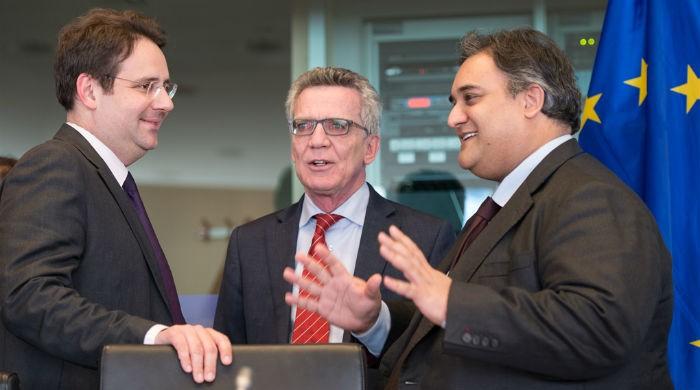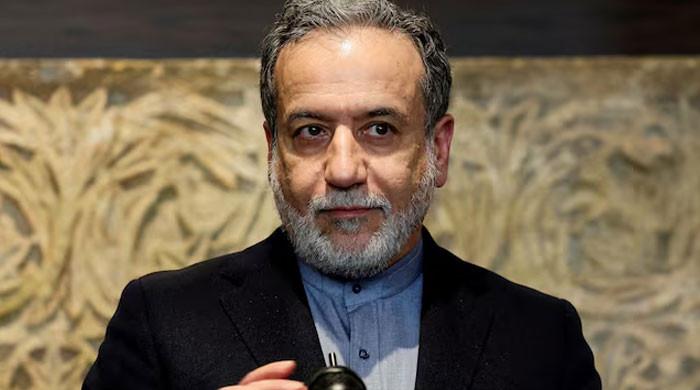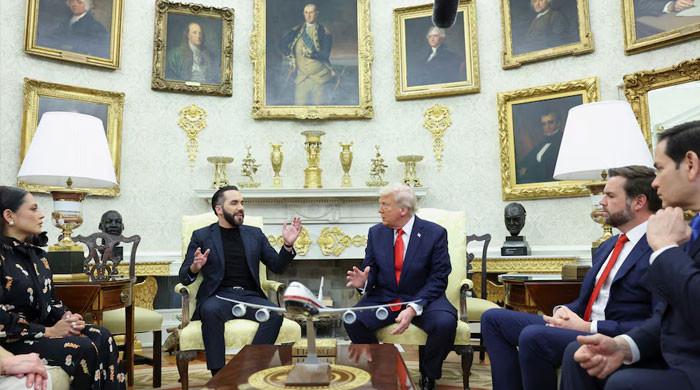EU needs to decide a clear definition of “terrorist”, says MEP
In a high level parliamentary briefing, ministers explained various proposals and decisions to be implemented in coming months on emergency basis
March 28, 2017

BRUSSELS: The European Union appears all set to impose tough security measures to identify existing and potential terrorists, stop infiltration from other countries and prevent radicalisation of youth in Europe. The proposed measures include stricter border control, detailed checks at airports, introduction of biometrics in ID documents, internet and smart phone regulation, extensive data collection and “powerful” law enforcing agencies.
In a high level parliamentary briefing, declared as "extraordinary" by European Parliament's Committee on Civil Liberties, Justice and Home Affairs, the German and French interior ministers explained various proposals and decisions to be implemented in coming months on emergency basis. The refugee crisis loomed over the entire debate and a sense of melancholy prevailed over failure of EU institutions in ensuring security of its citizens. The terrorist attacks in France, Germany, Belgium and London were mentioned repeatedly. The ministers agreed that the EU and its national governments could not afford wasting more time.
The house full of members of European parliamentarians questioned, commented, suggested and criticised at length. Many outright rejected the approach towards understanding and tackling the issues of extremism, radicalisation and terrorism especially in the context of refugee crisis.
How to define, identify and apprehend infiltrating terrorists?
The issue took a central position in the debate and prompted many comments and questions. As answers, the ministers pointed out measures like stricter immigration policies, thorough check of every visa, stronger surveillance during airport clearance, better border management with well equipped and well trained border guards. It was also suggested that illegal and under-serving refugees should be sent back.
One MEP said that some countries had warned that terrorists were using the migration wave to enter into Europe but Europe failed to heed to their warning. Another MEP said that the only way to stop migration or asylum seekers was to rebuild war-ravaged countries and help develop just, democratic societies in those regions. The MEPs discussed how Europe could stop its residents to travel to Syria, who then return with anger, hatred, and the determination of a trained terrorist.
German Interior Minister Thomas De Maiziere announced that a strict entry and exit system within the Schengen borders was inevitable by mid-2017. “We should know who is crossing the EU border for exit and entry and that data should be coordinated with real time access to relevant departments”, he said. He agreed that it was wrong to equate migrants with terrorists but it was undeniable, according to him, that many terrorists deliberately entered Europe in the guise of refugees. He accepted that EU should resort to Dublin Regulations and effectively place the system in frontline member states.
How to enhance security and prevent radicalisation?
The effective system of data collection and its coordinated dissemination to relevant stake-holders was identified as a fundamental goal to achieve within this year. Both the ministers announced the formation of a Counter-Terrorism Centre at European level. The ministers admitted that the existing data collection presented a chaotic situation between centre and national governments, on one hand, and between different departments, at the other. “The relevant departments should have real time data access”, Thomas De Maiziere said.
Some of the MEPs asked for biometric system for the ID cards. French minister Matthias Fekl said smartphones and internet operations will be brought under regulations.
About internal grounds brooding terrorism, MEP Helga Stevens said 51 radical organisations were active in Molenbeek area of Brussels and nobody had any clue how to tackle this issue. Ana Gomes demanded effective laws against money laundering system and safer and legal ways for immigration in order to prevent human smugglers. One MEP asked if tough border control and surveillance measures meant accepting the demands of far right populists. Another MEP emphasised upon the need to have a clear definition of a terrorist.
The ministers seemed perplexed over imminent contradiction between security measures and a citizen's fundamental rights including the right to move, right to privacy and right to belief. Moreover, they had no sufficient answers when many MEPs mentioned the failure of implementing existing laws and announced measures. The only blanket answer was that the current situation demanded urgent steps taken in the spirit of unity and coordination.
The ministers agreed to the criticism over the issue of relocation of refugees from Greece and Turkey. Only 15,000 refugees have been relocated while over 145,000 are languishing in Greece and Italy in most deplorable conditions.”It is a daunting task to implement the laws against terrorism while ensuring the fundamental rights of citizens,” said the German interior minister.












